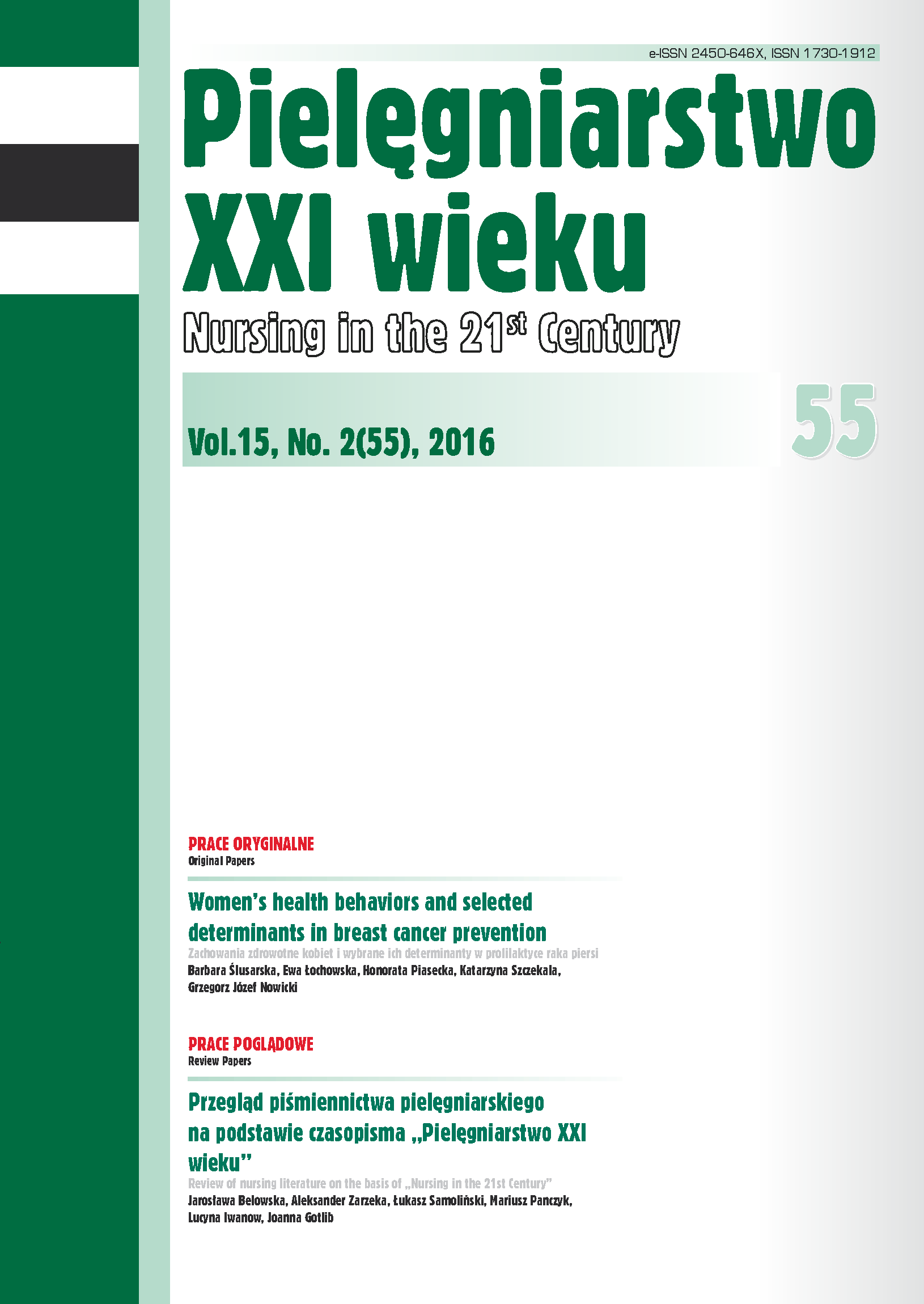The reasons of stress in dialyzed patients
DOI:
https://doi.org/10.1515/pielxxiw-2016-0012Keywords:
dialysis patient, stress, nurseAbstract
THE REASONS OF STRESS IN DIALYZED PATIENTS
Introduction. Patient with chronic renal failure and in need of renal replacement therapy is exposed to stress. The chronic disease reduces or even prevents meeting the psychosocial needs. There are also many other factors which intensify the stress. Their identification is an important element of finding remedies and giving effective support to patients.
Aim. The aim of an article is to find causes of dialyzed patients’ stress.
Material and methods. There were examined 100 patients suffering from renal failures, using a questionnaire survey designed by the authors. The findings were analyzed statistically. A homogeneity test looking at unrelated quality characteristics was used for checking whether there were any differences between compared groups of patients.
Results. Seventy-four percent of patients pointed to the fact that they were stressed by the new situation. The necessity of altering their lifestyle was mentioned by 84% of respondents. Almost a half of patients (41%) had to quit their jobs. Almost one out of three felt discriminated by the society against their renal replacement therapy.
Conclusions. The findings of this research suggest that renal replacement therapy can become a direct source of stress among patients. Moreover, patients feel stressed because of necessity of changing their lifestyles and giving up their jobs. There is a relationship between the attitude of the closest people and patients’ needs for support.
References
1. Horney K. Neurotyczna osobowość naszych czasów. Poznań: Wydawnictwo REBIS; 2009, s. 71.
2. Kubacka-Jasiecka D. Struktura „ja” a związek między agresywnością i lękiem. Rozprawy Habilitacyjne nr 119. Kraków: Wydawnictwo UJ;1986, s. 218.
3. Sapilak B, Kurpas D, Steciwko A, Melon M. Czy jakość życia jest istotna dla chorych dializowanych? Problemy Lekarskie. 2006; 45: 89-93.
4. Sapilak B, Kurpas D, Steciwko A, Melon M. Profil osobowości i zaburzenia nastroju pacjentów przewlekle hemodializowanych. Problemy Lekarskie. 2006; 45: 94-96.
5. Rutkowski B. (red.). Leczenie nerkozastępcze w praktyce pielęgniarskiej. [W:] Majkowski M, Steciwko A, Sapilak BJ. Problemy psychologiczne u pacjentów leczonych nerkozastępczo. Gdańsk: Wydawnictwo Via Medica, s. 2008.
6. Afeltowicz Z. Stan psychiczny chorych dializowanych. [W:] Rutkowski B. red. Dializoterapia w codziennej praktyce. Gdańsk: Wydawnictwo MAKmed, 1996.
7. Reykowski J. Eksperymentalna psychologia emocji. Warszawa: Wydawnictwo K i W, 1974.
8. Sapilak B, Steciwko A. Depresja i zaburzenia lękowe występujące w trakcie długotrwałej hemodializoterapii. Problemy Lekarskie. 2004; 43: 3-4, 109-114.
9. Bartosz J. Sapilak B. Ocena nasilenia objawów lękowych i depresyjnych oraz jakości życia chorych przewlekle leczonych nerko zastępczo. [W:] Zastosowania metod statystycznych w badaniach naukowych III; Jakubowski J, Wątroba J (red.). Kraków: StatSoft Polska Sp. z o.o., 2008; s.165-172.
10. Bereza B. Źródła niepokoju długotrwale hemodializowanych. Praca poglądowa. Psychiatria w Praktyce Ogólnolekarskiej. 2007; 7 (1): 8-14.
11. Rymaszewska J, Kłak R, Synak A. Camberwell Assessment of Need for the Elderly (CANE) – badanie polskiej wersji narzędzia Camberwell Assessment of Need for the Elderly (CANE) – study of Polish version of the tool. Psychogeriatria Polska. 2008;5(2);105-113.
Published
Issue
Section
License
Copyright (c) 2016 Authors

This work is licensed under a Creative Commons Attribution-NonCommercial-NoDerivatives 3.0 Unported License.




